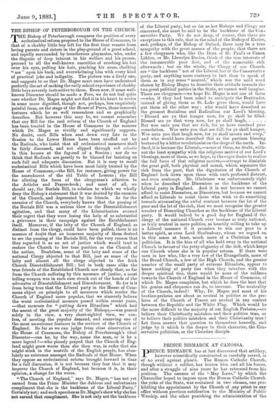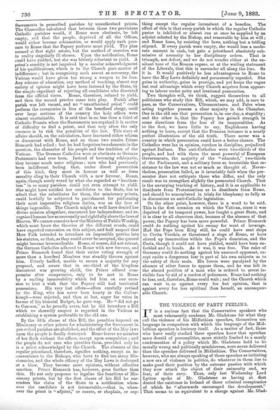PRINCE BISMARCK AT CANOSSA.
1)RINCE BISMARCK has at last discovered that artillery, however scientifically constructed or carefully served, is of no avail against ghosts. The Roman Catholic Church, though without a soldiet, has beaten him and all his forces, and after a struggle of nine years he has retreated from his position. The essence of the "May Laws," by which the Chancellor hoped to impose upon the Roman Catholic Church the yoke of the State, was contained in two clauses, one prohibiting the appointment by the Church of any priest to any office without previous notification to the Ministry of Public Worship, and the other punishing the administration of the
Sacraments in proscribed parishes by unauthorised priests. The Chancellor calculated that between these two provisions Catholic parishes would, if Rome were obstinate, be left empty, and that the people, deprived of all the Offices, would either become schismatics, or would apply such pressure to Rome that the Papacy perforce must yield. The plan seemed at first sight astute, but the method of coercion was in reality singularly ill chosen. Upon the notification, Rome could have yielded, but she was bitterly reluctant to yield. A priest's sanctity is not impaired by a secular acknowledgment of his qualifications, which is to the Church pure matter of indifference ; but in recognising such assent as necessary, the Vatican would have given too strong a weapon to its foes. Any scheme of education, any method of teaching, almost any variety of opinion might have been fostered by the State, by the simple expedient of rejecting all candidates who dissented from the official views. Rome, therefore, refused to yield, and then the second proviso came into play. Parish after parish was left vacant, and no "unauthorised priest" could perform the ceremonies in lieu of the beneficed clergy, until over large sections of the country the holy offices were almost unattainable. It is said that in no less than a third of Catholic Prussia when the Sacraments are required it is matter of difficulty to find a priest, and that very often the only resource is to risk the penalties of the law. This state of affairs should, on the calculation, have increased either schism or discontent with Rome, and on those two results Prince Bismarck had relied ; but he had forgotten two elements in the question, the character of his people and the tradition of the Vatican. The German Catholics were as obstinate as German Protestants had ever been. Instead of becoming schismatic, they became much more religious ; men who had previously been indifferent feeling that, under direct persecution of this kind, they must in honour as well as from morality cling to their Church with a new fervour. Rome, again, though sorely vexed by what she regarded as " heathenism " in so many parishes, could not even attempt to yield. She might have notified her candidates to the State, but to admit that the substitutes for them, the missionary priests, could lawfully be subjected to punishment for performing their most imperative religious duties, was on the face of things impossible. The Church might as well have denied her divine mission altogether, renounced her independence, and re' cognised human law as necessarily and rightfully above the laws of Heaven. We cannot conceive how the Ministry of Public Worship, which must know the theories of the different creeds, could have expected concession on this subject, and half suspect that Herr Falk intended to introduce an impossible proviso into his statutes, so that, as they could never be accepted, the quarrel might become irreconcileable. Rome, of course, did not retreat, the German Catholics adhered to Rome with new fervour, and Prince Bismarck found that 'their entire voting strength of more than a hundred Members was steadily thrown against him. Utterly baffled, unable to secure a majority for any proposal, and aware that in one-third of the kingdom discontent was growing shrill, the Prince offered compromise after compromise, only to be met in Rome by a smiling immovability which led him on one occasion to hint a wish that the Papacy still had territorial possessions. His very last offers—offers carefully revised by the King, who has never been hearty in the °altarkampf—were rejected, and then at last, eager for votes in favour of his biennial Budget, he gave way. He "did not go to Canossa," as he proudly avers, but he did introduce a Bill which we shrewdly suspect is regarded in the Vatican as establishing a system preferable to the old one.
By the fifth clause of this Bill, the penalties imposed on Missionary or other priests for administering the Sacrament in promribed parishes are abolished, and the effect of the May laws upon the people is finally destroyed. Rome leaves no member of her flock without the offices, except upon compulsion ; and the people do not care who provides them, provided only he is a priest acknowledged by the Church. The absence of the regular priesthood, therefore, signifies nothing, except an inconvenience to the Bishops, who have to find too many Missionaries, and the whole efficacy of the May Laws is destroyed at a blow. They become mere opinions, without effective sanction. Prince Bismarck has, however, gone further than this. He not only proposes to legalise the functions of Missionary priests, but by the first clause of his Bill he surrenders the claim of the State to a notification whenever the candidate is not irremovable,—that is, whenever the priest is " adjoint," or curate, or chaplain, or any
thing except the regular incumbent of a benefice. The effect of this is that every parish in which the regular Catholic pastor is inhibited or absent can at once be supplied by an adjoint selected by the Bishop, and removable by him at will ; and Rome loses, by resisting the laws, nothing but a triffing stipend. If every parish were empty, she would lose a moderate amount in cash, but gain a priesthood absolutely submissive of necessity to her disciplinary orders. That is triumph, not defeat, and we do not wonder either at the exultant tone of the Roman organs, or at the wailing statement of the Liberals, that this is surrender all along the line. So it is. It would positively be less advantageous to Rome to have the May Laws definitely and permanently repealed. She gains in authority, gains in prestige, and yet keeps the vague but real advantage which every Church acquires from appearing to labour under petty and irrational persecution.
Two thoughts will, we think, suggest themselves to all politicians who study this Bill, which, we may add, is sure to pass, as the Conservatives, Ultramontanes, and Poles when acting together possess a clear majority in the Chamber. One is the old one that persecution is, in our day, a stupidity ; and the other is, that the Papacy has gained strength in some directions from the loss of its temporalities. As to the first, we have little to say, Englishmen having nothing to learn, except that the Prussian instance is a nearly perfect illustration of the old truth. There never was a country in which persecution could have a better chance. The Catholics were lax in opinion, careless in discipline, prejudiced against Italians. The anti-Catholics were two-thirds of the people, and had with them the most powerful of European Governments, the majority of the "educated," two-thirds of the Parliament, and a military force so irresistible that resistance to the law was not so much as thought of. Nevertheless, persecution failed, as it invariably fails when the persecutor dare not extirpate those who differ, and the only result was to strengthen slightly the persecuted Church. That is the unvarying teaching of history, and it is as applicable to dissidents from Protestantism as to dissidents from Rome, and should be remembered in trials for blasphemy as fully as in discussions on anti-Catholic legislation.
On the other point, however, there is a word to be said. This is the first occasion on which the Vatican, since it was deprived of its temporal power, has fought a great State, and it is clear to all observers that, because of the absence of that power, the Papacy has been more powerful. Prince Bismarck could do nothing against his enemy for want of leverage. Had the Pope been King still, he could have sent ships to Civita Vecchia, or threatened a siege of Rome, or have stirred up insurrection within the Pope's dominion, and the Curia, though it could not have yielded, would have been enfeebled and in bonds. As it was, it was free. The ruler of Germany could do nothing against his unarmed opponent, except excite a dangerous fear in part of his own subjects as to the safety of their souls. His forces were paralysed by the absence of other forces to oppose them, and he was left in the absurd position of a man who is ordered to arrest invisible foes by aid of a cordon of policemen. Rome had nothing to fear, and, therefore, Rome could wait ; and the Church which can wait is, as against every foe but opinion, that is against every foe less spiritual than herself, an unconquerable Church.



































 Previous page
Previous page